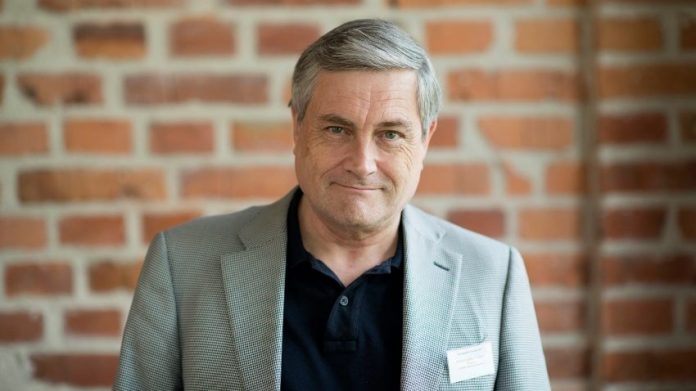Professor Christopher Coker, the political scientist and political philosopher and director of LSE IDEAS, LSE’s foreign policy think tank, equally admired for his brilliant mind, wit and kindness, has died, the London School of Economics said. He was 70.
Scholars, colleagues and friends on Wednesday paid tribute to his books on war, his entertaining lectures, and the support he offered colleagues and students.
Professor Coker died on September 5, the London School of Economics said.
„Of those scholars who have written on war or transatlantic relations during the past 50 years, Christopher was one of the most starkly insightful; perhaps none wrote with such aplomb,” said Terence McNammee, a former PhD student in a post on Facebook. “His lectures at LSE and in numerous halls and institutions across the world where he became a regular speaker were the stuff of legend.”
“Professor Coker was a world-renowned academic who dedicated his life to writing extensively on all aspects of war,” LSE said in a statement.
„Christopher was a most incredible professor, intellectual, human being and inspiration to all who have known him, ” wrote Nicolae Ratiu, Chairman of the Ratiu Foundations who worked with him for almost 5 years to develop the Ratiu Forum/LSE IDEAS association „into a significant and admired hub on the CEE map of rare thoughtful debate.”
„We must and shall carry on and perpetuate his legacy, building on what he has shown us to be possible. Under the circumstances, it is the most important thing we can do to show our admiration and respect for him and to register our eternal appreciation for the example he gave us. This is indeed his own immortality, Mr. Ratiu added.
Professor Coker was a twice serving member of the Council of the Royal United Services Institute, a former NATO Fellow and a regular lecturer at Defence Colleges in the UK, US. Rome, Singapore, and Tokyo. He was also a Visiting Fellow at the National Institute for Defence Studies in Tokyo, the Rajaratnam School for International Studies Singapore, the Political Science Dept in Chulalongkorn University, Bangkok and the Norwegian and Swedish Defence Colleges, the LSE said.
His publications include Rebooting Clausewitz (Hurst, 2015), Future War (Polity, 2016), and The Rise of the Civilizational State (Polity, 2019). His most recent book was, Why War? (2020).
“Like all of us who had the privilege of learning from Christopher, meetings with him, … often left you looking at the world in a new way. We loved him. And he loved us,” McNammee added.
In some ways, Professor Coker was from another age, a conservative at heart in military matters who was not at home with some recent societal changes. He only acquired a smart phone in the last couple of years, for example.
Young academics and journalists in Romania where I met him in 2019 almost hero worshiped him, saying he reminded them of a 1940s British intelligence officer or an academic James Bond deciphering the world, a description I suspect he enjoyed.
In an era of social media and self-promotion, Professor. Coker seemed loath to put himself forward, possibly because he thought it was undignified and certainly because he wanted to live his life and career on his own terms.
Despite his lack of enthusiasm for promoting himself, he was unflinchingly generous in his support of colleagues and students. Many called him their mentor after his death.
Not demonstrative in words, he told me in June at the annual meeting of the Ratiu Dialogues on Democracy in Romania, that he considered his students to be his children. Colleagues said he demonstrated his affection in concrete support.
An intensely private and courteous man without airs and graces, friends said he lived life on his own terms. As well as books such as “Why War?” he was known for his entertaining lectures he gave at the LSE and around the world where he used Tinkerbell and Britney Spears to explain the intricacies of war.
A bon vivant to some extent, he enjoyed good company and food, intellectual debate, cigars and good liquor–not necessarily in that order. Even at the end of a convivial evening as talk stretched into the wee hours, he never appeared to lose his good judgement and sense of self.
But he could also be shy in social settings and needed a drink or two to feel at ease, friends said. Despite his popularity, suave good looks, brilliance and humanity, he had no partner—neither did he have any siblings or children.
I personally sought out Christopher for his advice, which was unfailingly witty. I asked him this summer about a colleague who had left the department under a cloud. “We don’t talk about X,” he said. “It’s the Soviet Politburo,” adding he was relieved by the person’s successor. Intrigued to hear his opinion on the pro-Russian writings of a British academic, he retorted: “I don’t think about him. He doesn’t exist.”
„Christopher’s originality of thought and sparkling intellect shaped a generation of scholars, policy makers and students studying war in our times,” said Co-Director at LSE Ideas, Professor Chris Alden. ’
Centre manager Dr. Emilia Knight called him “a superb colleague and leader at IDEAS, and the kindest person.’’
There was no immediate word on funeral arrangements. Professor Coker is mourned by legions of friends, colleagues and former students.
EXCLUSIVE | China’s ‘bromance’ with Russia will be hard to give up-LSE professor Christopher Coker















